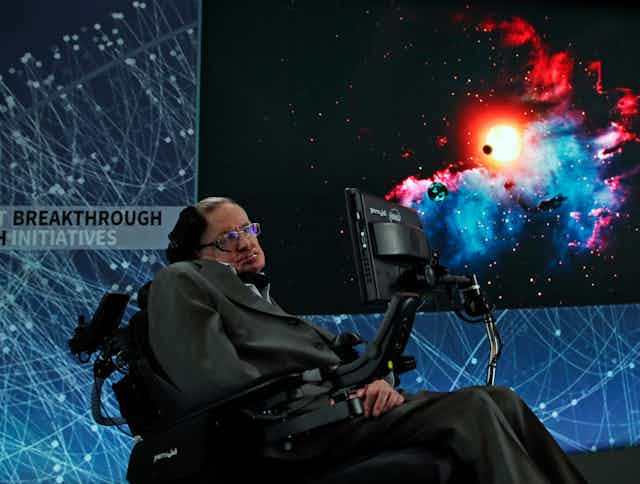“Spreading out into space will completely change the future of humanity,” says Stephen Hawking. It “may be the only thing that saves us from ourselves. I am convinced that humans need to leave Earth”.
The world-famous physicist was talking at a recent science festival in Trondheim, Norway. And his keynote speech to the Starmus Festival about giving humanity a sense of purpose raises some very important questions about our views of positive futures.
For Hawking “a new and ambitious space programme would excite (young people), and stimulate interest in other areas, such as astrophysics and cosmology”. Humans have to leave Earth, he explained, due to an array of threats including asteroid strikes, resource depletion, overpopulation, deforestation, decimation of animal species, and the effects of human made climate change (particularly rising temperatures and melting ice caps).
Yet hearing such a viewpoint in response to the challenges we face leaves me cold. We cannot flee the apocalypse forever, leaving a chosen few to flourish on other planets; we need positive visions for humanity here on Earth.
I am not a physicist, I research and teach in a business school about how people and organisations go about taking action to address sustainability challenges, such as the global ecological threats mentioned by Hawking.
The concept of sustainability has been traced back to ideas that emerged in forestry about 300 years ago to sustain yields. The general implication of this expansive and slippery concept is that we need to work out ways to sustain both the social (including economic) and ecological processes that enable us to live in ways that we value.

Key questions are raised by Hawking’s speech and we can use these questions to briefly explore Hawking’s ideas about a future for humanity:
What is being sustained?
Hawking’s suggestion is that by establishing colonies on the moon or Mars we are helping to guarantee that some form of human life will continue beyond Earth being humanly habitable. What is being sustained is a protected bubble of a small selection of humans in artificially created Earth-styled environments somewhere in space.
How long is it being sustained?
Given his background in research into how the universe began – and will end – it is perhaps no surprise that in Hawking’s vision for humanity the time horizons are very long. His intention is for another million years of human life, with our space colonies enabling us to live even beyond the life of Earth itself.
In whose interest is what being sustained?
We can identify a range of core interests who would benefit from Hawking’s idea of humanity spreading out into space, including astrophysicists, astronauts, space agencies (science-related areas of work) which tend to be much more appealing to men and the members of the future space colonies.
But what about everyone not on the Ark?
The problem is that such a purpose or vision for humanity involves, and is relevant for, very limited groups of people. They will generally do certain types of jobs, and will be citizens of, or live in, those few countries that are putting serious money into space exploration. It’s easy enough to imagine a colony on Mars with the same sort of demographic makeup as a Silicon Valley tech giant. It’s much harder to imagine a colony populated by people with little financial wealth from less wealthy countries – the very people most affected by the environmental threats Hawking refers to.
I don’t have any particular objections to space travel itself. Interplanetary tourism doesn’t come cheap of course, and isn’t great for the carbon footprint, but if people want to leave planet Earth they are welcome to do so. My concern is that such visions are being presented as a benefit for all of human society.
Fostering ambivalence
After Hawking’s speech to the Starmus Festival, audience members put it to him that it would be better to spend our money on solving the problems of this planet. Hawking’s view is also one that is likely very enticing for a few, but alienating for many. This is partly because of the hopelessness of the apocalyptic vision for planet Earth, which is his starting point. This gloomy scenario can foster ambivalence by belittling what we can each do in the face of such enormous problems.
Hawking also puts too much emphasis on technology. The problem with sustainability visions that rely on tech advancements is they rarely factor in the complex task of sustaining conducive social-ecological relations. Yes, humans may eventually invent nuclear fusion, or a great way to suck carbon out of the atmosphere. But we’ll invent harmful things too, providing even more ways to trash the planet. Which sets of technologies are more significant will be a question of politics, not science.
It can be very difficult to face up to the social and ecological challenges that scientists have outlined and still develop some enthusiasm for positive “approach goals” instead of negative “avoidance goals”. New technologies are part of the positive picture, but too much tech talk is a distraction.
As we each develop our own view about what a positive future would look like, it’s clear that the real innovation must be in the ways we organise ourselves and live together on Earth – as there’s not much hope in only aiming for a life on Mars.

